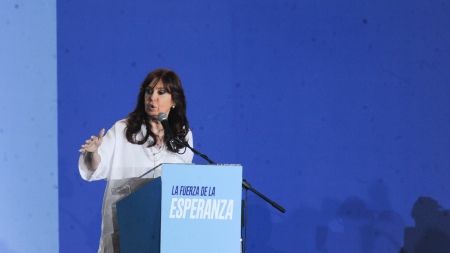Vice President Cristina Fernández de Kirchner reaffirmed this week the majority support of Peronism in the province of Buenos Aires after incorporating the security problem as one of the priorities of the public agenda and already more than one leader promotes his candidacy for next year’s elections.
“The ’10’ of the Frente de Todos has a single name: Cristina Kirchner”they say in tune with the World Cup, various mayors with strong electoral weight, after the massive act on Thursday in La Plata and the subsequent dinner they shared at the residence of Governor Axel Kicillof.
At the request of the communal chiefs and the voices within the FdT that publicly promote his candidacy, the Vice President was in charge of calming the anxieties and manage time during his speech for the Day of the Militancy at the Diego Maradona stadium in La Plata, where a crowd remembered the 50th anniversary of Perón’s return to Argentina after 17 years of exile.
In front of a packed stadium, in which the motto “The strength of hope” was released and which insistently chanted the slogan “Cristina Presidenta”, Fernández de Kirchner warned: “As the General said, everything in its measure and harmoniously.”
With the president Alberto Fernández on tour abroad on the occasion of the G-20 summit and a speech by the head of the Senate without strident claims to the Executive, the internal tension subsided and a change of spirit is shaping up in the FdT, in times in which the World Cup fever channels emotions towards a fervor fueled by expectation.
That climate of hope and illusion spread immediately for the Day of Militancy, both among the militants and among the leaders with management responsibilities, who said they were convinced that “there is 2023” and that it is possible to achieve a victory at the polls, thus defeating a wave of demoralization that seemed to have taken over almost all of the ruling party after the defeat in the 2021 legislative elections.
Thursday, in the province of Buenos Airesscene of the mother of all battles for being the district that the PJ always bet on to try a difference in votes, Cristina Kirchner ratified her centrality and her ability to surprise by including as a key topic a problem that affects his electoral base every day: insecurity.
The Vice President and her collaborators know, like the rest of the internal spaces of Justicialism, that without the support of the suburban municipalities it will be impossible to dispute an internal one within the official coalition, much less fight against Together for Change in the general elections.
Security, an issue that enlists mayors
In that line, the reflection on the debt of all governments in terms of security and the reference to the need to an “order” that generates tranquility in familiespoint to column behind the ex-president the main mayors and referents of the province of Buenos Airesas observed at dinner on Thursday at Kicillof’s official residence.
That tacit pact that the suburban leaders have had with Cristina Kirchner for years seemed to be sealed once again.
At the table, led by the Vice President, were Kicillof, Andrés Larroque, Eduardo “Wado” de Pedro, Verónica Magario, Martín Insaurralde, Fernando Espinoza, Mayra Mendoza, Máximo Kirchner, Teresa García, Gabriel Katopodis, Gustavo Menéndez, Alberto Descalzo, Mariano Cascallares, Mariel Fernández, Mario Secco, Luana Volnovich and Jorge Ferraresi, among others.
From the environment of the Vice President, they remarked that, upon arriving at the meeting and greeting the head of the Senate, all the mayors highlighted the fragment of the speech on security.
“It was unanimous. Everyone appreciated that one of the biggest problems people have is being talked about”the sources stated.
In his previous speech, Fernández de Kirchner had said: “The security forces are part of the solution, but they are also part of the problem if they do not subordinate themselves to civil power.”

“When we were in government, we deployed thousands of gendarmes in the suburbs in the Sentinel operation. I still don’t know why we can’t do the same thing again: deploy thousands of gendarmes here in the Buenos Aires suburbs instead of having them in the middle of Nobody knows what to do in Patagonia. It seems to me that it is time to take a look at the places that are suffering,” he demanded.
One of the barbecue attendees framed those sayings as the first step to install key themes that the FdT will deploy as a proposal during the 2023 presidential campaign.
“Cristina went into electoral mode and, without saying if she will be a candidate or not, she began to build to solve the problems of the people”, interpreted the diner.
During the meeting that lasted for more than 3 hours, the head of the Senate asked the mayors to assume a ‘front line’ role to spread the Actions carried out in the 12 years of Kirchnerismwhen from 2003 they sought to “live better” and “recover a bankrupt Argentina in 2001”.
“We have to remember that a few years ago it was possible to create a country where one could live better,” exhorted the Vice President in what resonated without euphemisms as an invitation to society.
This is a proposal that implicitly takes up the assumptions of the recent and successful campaign of President-elect Luiz Inácio Lula Da Silva in Brazil, a message that could be summarized in the following hypothesis: “If we were able to do it in the past, we will be able to do it in the future.”
Anibal and Berni on security
Regarding security concepts, the statements that were made in the La Plata stadium quickly reached the ears of the Minister of Security, Aníbal Fernández, and his counterpart from the Province, Sergio Berniwho defended their respective efforts Y recognized the leadership of Fernández de Kirchner, without hiding any difference in the case of the first.
From his career during Kirchnerism, Fernández remarked: “I cannot hide the love and affection I feel for her (Cristina). She is my family, I come from there and I don’t plan to leave there. I agree with most of what she said.”
The quilmeño showed some qualms when referring to the warning about the risk of autonomization of the security forces with respect to civilian control, while his Buenos Aires counterpart Berni stressed that “what Cristina said about security is music to my ears” since -she stated- “it is what we have been asking for years”.















